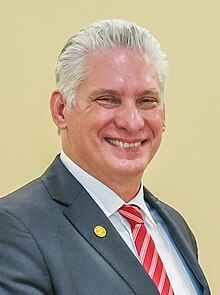| First Secretary of the Communist Party of Cuba | |
|---|---|
| Primer Secretario del Partido Comunista de Cuba | |
 Logo of the Communist Party of Cuba | |
since 19 April 2021 | |
| Central Committee | |
| Style | Comrade (formal) |
| Type | Party leader, Supreme leader |
| Member of | Central Committee, Politburo, Secretariat |
| Seat | Palace of the Revolution Havana, Cuba |
| Appointer | Central Committee |
| Term length | Five years, renewable once |
| Constituting instrument | Statute of the Communist Party of Cuba |
| Formation | 18 August 1925 |
| First holder | José Miguel Pérez |
| Deputy | Second Secretary |
 |
|---|
|
|
The First Secretary of the Central Committee of the Communist Party of Cuba is the top leader of Cuba. The First Secretary is the highest office within the Communist Party of Cuba as well as ranking first in the Politburo, the highest decision-making body in Cuba, which makes the office holder the most powerful person in the Cuban government. In communist states the First or General Secretary of the Communist Party is typically the de facto leader of the country and a more powerful position than state offices such as President (head of state) or Prime Minister (head of government), when those positions are held by different individuals.[1]
The officeholder of the post of first secretary presides over the work of the Central Committee of the Communist Party of Cuba (PCC), which is designated as "the organised vanguard of the Cuban nation" and as "the superior driving force of society and the State" by Article 5 of Cuba's constitution.[2] The PCC Central Committee, the Party's highest political-executive organ between convocations of the party congress, has the right to elect and dismiss the first secretary at one of its sessions. The first secretary is responsible for leading the work of the Secretariat, the Party's highest executive organ, and chairing the sessions of the Politburo, the Party's highest political organ. The current first secretary is Miguel Díaz-Canel, elected by the 1st Session of the 8th Central Committee on 19 April 2021, and he concurrently serves as president of Cuba.
The first forerunner organisation to the present-day PCC was formed on 18 August 1925, and it elected the Spain-born José Miguel Pérez as its leader. Due to repressive actions by the Cuban state of Gerardo Machado, Pérez was kicked out of the country thirteen days later, on 31 August.[3] This brought the newly-established party into turmoil, and José Peña Vilaboa took over Pérez's position and kept the position until his death on 13 March 1927. Due to his health struggles, Miguel Valdés García served as acting general secretary for most of Peña Vilaboa's tenure.[4] Valdés García continued to do so until April 1927, when Joaquín Valdés Hernández was elected general secretary.[4] State repression and bad organisation brought party work to a standstill until the Communist International (Comintern) appointed Jorge Abilio Vivó d’Escoto as party general secretary in 1930.[5] In August 1933, a general strike took place in Havana that called for Machado's removal. Vivó is said to have misjudged the revolutionary situation, and he was forced to step down on the Comintern's orders at the 2nd Congress, held on 20–22 April 1934.[6] Blas Roca Calderio was elected in Vivó's place and stayed in office until 24 June 1961 when the party merged with the 26th of July Movement and the Revolutionary Directorate of 13 March Movement to form the Integrated Revolutionary Organizations (IRO), which elected Fidel Castro as its first secretary.[7] The IRO was transformed into the United Party for the Socialist Revolution of Cuba (PURSC) on 26 March 1962. Three years later, on 3 October 1965, the PURSC convened the 1st Congress of the newly-established Communist Party of Cuba. The 1st Central Committee, which had been elected by the 1st Congress, convened for its 1st Session on 3 October 1965 and elected Fidel as first secretary.[8] He remained in office for 49 years until the convocation of the 1st Plenary Session of the 6th Central Committee on 19 April 2011, which elected his brother Raúl Castro to succeed him in office.[9] Raúl remained in office for two electoral terms and was succeeded by Miguel Díaz-Canel on 19 April 2021.[10]
- ^ "Raul Castro to lead Cuba's Communist Party until 2021". FRANCE 24. 19 April 2018. Archived from the original on 18 July 2018. Retrieved 23 April 2018.
"I confirm to this assembly that Raul Castro, as first secretary of the Communist Party, will lead the decisions about the future of the country," Diaz-Canel said.
- ^ Molina 2021.
- ^ López-Trigo 2021.
- ^ a b Goldenberg 1969, p. 62; Blaquier 2005, p. 63.
- ^ Jeifets & Jeifets 2014, p. 183.
- ^ Jeifets & Jeifets 2014, p. 189.
- ^ Granma 2016.
- ^ Kapcia 2022, p. 453; López-Trigo 2021.
- ^ The Guardian 2011.
- ^ Meneses & Hernández 2021.
